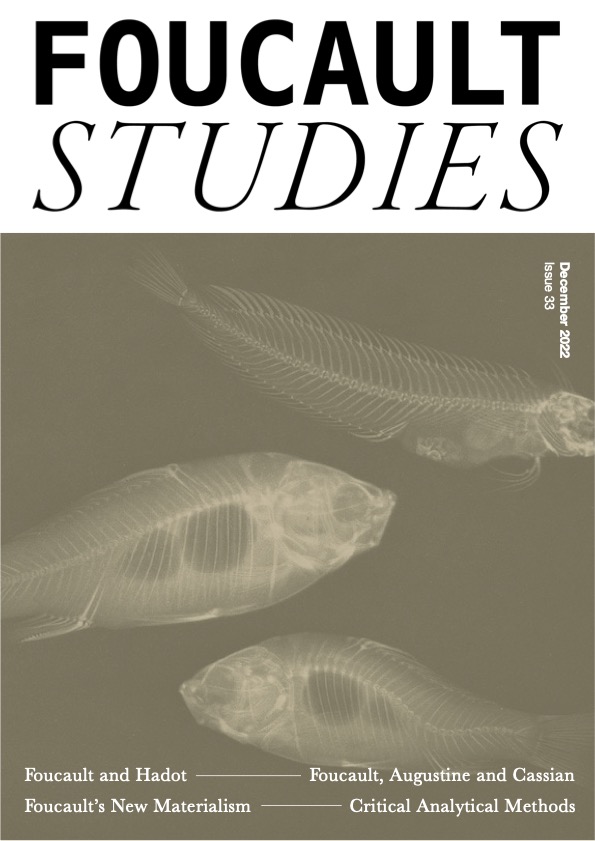Philosophy From the texture of Everyday Life: The Critical-Analytic Methods of Foucault and J. L. Austin
DOI:
https://doi.org/10.22439/fs.vi33.6802Keywords:
Michel Foucault, J. L. Austin, philosophical methodology, analytical philosophy, genealogy, ordinary language philosophyAbstract
In a 1978 lecture in Tokyo, Foucault drew a comparison between his own philosophical methodology and that of ‘Anglo-Saxon analytic philosophy’, claiming the label ‘analytic philosophy of politics’ for his own approach. This may seem like a somewhat surprising comparison given the gulf between contemporary analytic and continental philosophy, but I argue that it is a very productive one which indeed might help us reconsider this gulf. I proceed through a comparison between Foucault and the speech act theory of J. L. Austin, one of the analytic philosophers Foucault had in mind in his Tokyo lecture. By focusing on the methodological commonalities between Foucault and Austin, this article identifies the core of a philosophical methodology that cuts across the analytic/continental divide in philosophy in general while constituting a powerful alternative to the methods applied by analytic political philosophers specifically. This approach, which I term ‘analytic critique’, is one that starts from a critical analysis of what happens in ordinary lived experience and ‘bottom-up’ in an avowedly politically engaged way – thereby challenging the conceptual and political aloofness of contemporary political philosophy in the liberal-Rawlsian tradition. Foucault’s appropriation of the label ‘analytic philosophy’, it is argued, ought to function as a call to more imaginative methodological-theoretical engagement across the traditional division between continental and analytic approaches.
References
Austin, John L., How to Do Things with Words. Oxford: Oxford University Press, 1962.
Bourdieu, Pierre, Language and Symbolic Power. Cambridge: Polity Press, 1991.
Crary, Alice, “The Methodological Is Political: What’s the Matter with ‘Analytic Feminism’?” Radical Philosophy 2:2 (2018), 47–60.
Davidson, Arnold I, “Structures and Strategies of Discourse: Remarks Towards a History of Foucault’s Philosophy of Language,” in Foucault and His Interlocu-tors, ed. Arnold I. Davidson, 1-17. Chicago: The University of Chicago Press, 1997.
Dreyfus, Hubert L., and Paul Rabinow, Michel Foucault: Beyond Structuralism and Hermeneutics. 2nd ed. Chicago: The University of Chicago Press, 1983.
Forrester, Katrina, In the Shadow of Justice: Postwar Liberalism and the Remaking of Polit-ical Philosophy. Princeton University Press, 2019.
Foucault, Michel, A Verdade e as Formas Jurídicas. 3rd ed. [1973]. Rio de Janeiro: NAU, 2002.
Foucault, Michel, “La Philosophie Analytique de La Politique” [1978], in Dits et Écrits 1954-1988: III: 1976-1979, ed. Daniel Defert and François Ewald, 534-51. Paris: Éditions Gallimard, 1994.
Foucault, Michel, Power/Knowledge: Selected Interviews and Other Writings 1972-1977, ed. Colin Gordon. New York: Pantheon Books, 1980.
Foucault, Michel, Society Must Be Defended: Lectures at the College de France, 1975-76, ed. Mauro Bertani and Alessandro Fontana. London: Penguin Books, 2004.
Foucault, Michel, “The Analytic Philosophy of Politics” [1978], Foucault Studies 24 (2018), 188-200. https://doi.org/10.22439/fs.v0i24.5532
Foucault, Michel, The Archaeology of Knowledge [1969]. New York: Pantheon Books, 1972.
Foucault, Michel, The Birth of Biopolitics: Lectures at the College de France, 1978-79, ed. Michel Senellart. Basingstoke: Palgrave Macmillan, 2008.
Foucault, Michel, The History of Sexuality, Volume 1: An Introduction [1976]. New York: Pantheon Books, 1978.
Foucault, Michel, “The Subject and Power,” in Michel Foucault: Beyond Structuralism and Hermeneutics, ed. Hubert L. Dreyfus and Paul Rabinow, 2nd ed., 208–26. Chicago: The University of Chicago Press, 1983.
Fraser, Nancy, “Behind Marx’s Hidden Abode: For an Expanded Conception of Capitalism,” New Left Review 86 (2014), 55-72. https://doi.org/10.7312/columbia/9780231181518.003.0007
Fricker, Miranda, Epistemic Injustice: Power and the Ethics of Knowing. Oxford: Oxford University Press, 2007.
Glock, Hans-Johann, What Is Analytic Philosophy. Cambridge: Cambridge University Press, 2008.
Honneth, Axel, “The Possibility of a Disclosing Critique of Society: The Dialectic of Enlightenment in Light of Current Debates in Social Criticism,” Constellations 7:1 (2000), 116-27. https://doi.org/10.1111/1467-8675.00173
Kelly, Mark G. E., The Political Philosophy of Michel Foucault. London: Routledge, 2009.
Kelly, Mark G. E., For Foucault: Against Normative Political Theory. New York: SUNY Press, 2018.
Koopman, Colin, Genealogy as Critique: Foucault and the Problems of Modernity. Bloomington: Indiana University Press, 2013.
Langton, Rae, “Speech Acts and Unspeakable Acts,” Philosophy & Public Affairs 22:4 (1993), 293–330. https://doi.org/10.1093/acprof:oso/9780199247066.003.0002
Lemke, Thomas, “Foucault, Governmentality, and Critique,” Rethinking Marxism 14:3 (2002), 49–64. https://doi.org/10.1080/089356902101242288
Lorenzini, Daniele, “Performative, Passionate, and Parrhesiastic Utterance: On Cavell, Foucault, and Truth as an Ethical Force,” Critical Inquiry, 41:2 (2015), 254-268. https://doi.org/10.1086/679074
Mascaretti, Giovanni, “Introduction: The Analytic Philosophy of Politics,” Foucault Studies 24 (2018), 185–87. https://doi.org/10.22439/fs.v0i24.5532
Moi, Toril, “Thinking Through Examples: What Ordinary Language Philosophy Can Do for Feminist Theory,” New Literary History 46:2 (2015), 191–216. https://doi.org/10.1353/nlh.2015.0014
Patton, Paul, “Foucault’s ‘critique’ of Neoliberalism: Rawls and the Genealogy of Public Reason,” New Formations 80–81 (2013), 39–51. https://doi.org/10.3898/NeWF.80/81.02.2013
Patton, Paul, “Government, Rights and Legitimacy: Foucault and Liberal Political Normativity,” European Journal of Political Theory 15:2 (2016), 223–39. https://doi.org/10.1177/1474885115582077
Prado, Carlos G, Starting with Foucault: An Introduction to Genealogy. 2nd ed. New York: Routledge, 2018.
Rawls, John, Justice as Fairness: A Restatement. Cambridge, MA: The Belknap Press, 2001.
Shackel, Nicholas, “The Vacuity of Postmodernist Methodology,” Metaphilosophy 36:3 (2005), 295-320.
Singer, Peter, “Ethics and intuitions,” The Journal of Ethics 9 (2005), 331-352. https://doi.org/10.1007/s10892-005-3508-y
Tiisala, Tuomo, “Power and Freedom in the Space of Reasons.” PhD diss., Universi-ty of Chicago, 77-81, 2016.
Wolff, Jonathan, “Analytic Political Philosophy,” in The Oxford Handbook of the Histo-ry of Analytic Philosophy, ed. Michael Beaney, 795–822. Oxford: Oxford Universi-ty Press, 2013.
Downloads
Published
How to Cite
Issue
Section
License
Authors retain copyright to their work, but assign the right of the first publication to Foucault Studies. The work is subject to a CC BY-NC-ND 4.0 license, but despite these restrictions, authors can take for granted that Foucault Studies will permit articles published in Foucault Studies to be translated or reprinted in another format such as a book providing a full reference is made to Foucault Studies as the original place of publication.



